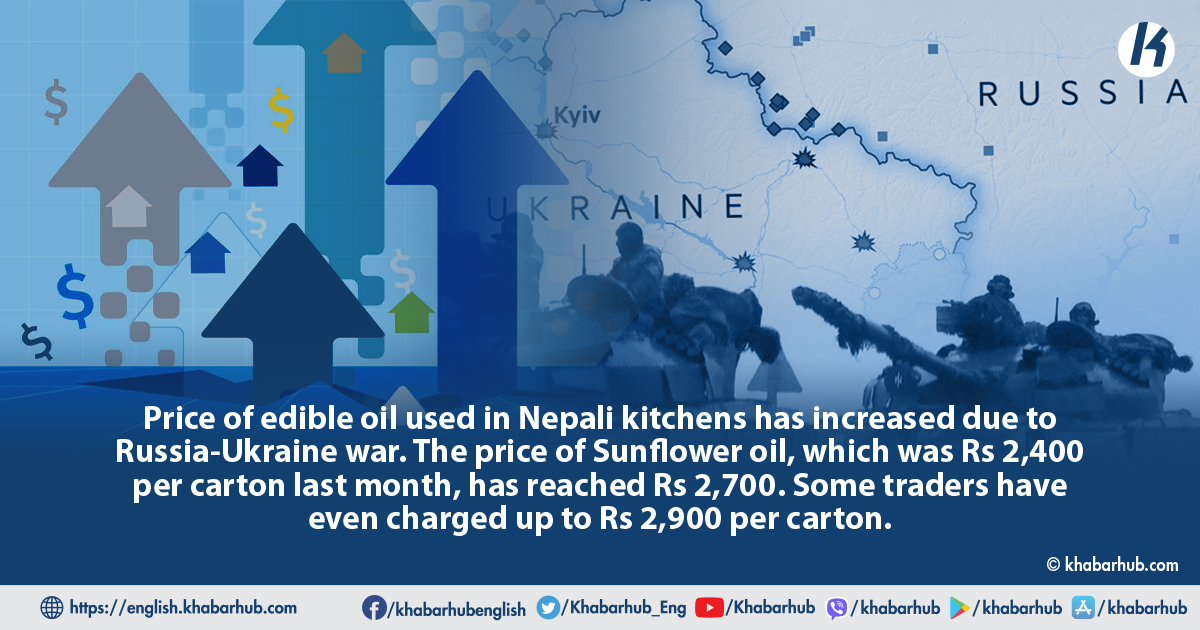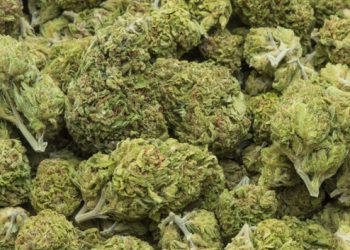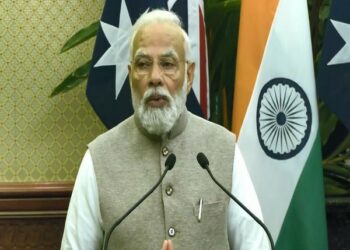KATHMANDU: Prices of edible oil, particularly sunflower oil, in Nepal are on an upwards spiral as a result of the ongoing crisis between Russia and Ukraine.
Russia and Ukraine are the top producers and exporters of sunflower oil.
Since the war between these two countries has created a supply crunch in the market, this has led to soaring prices.
It’s most likely that Nepal, too, will be hit harder.
The war has adversely not affected normal lives in Ukraine and Russia but has impacted the entire world, particularly the under-developed countries.
Nepalis, too, are no exception as they have been adversely affected by the ongoing war. There has been a shortage of raw materials due to disruption in the supply chain. Prices of stuff like major metals and many minerals, edible oil have reached record levels.
The price of consumer goods has skyrocketed due to the war. After the war broke out, even the Nepalese rupee has weakened and the price of daily commodities — from oil to gold — has skyrocketed.
Cooking Oil
The price of edible oil used in Nepali kitchens has increased due to the war. The price of sunflower oil, which was Rs 2,400 per carton last month, has reached Rs 2,700. Some traders are even selling oil at Rs 2,900 per carton. Interestingly, even soyabean oil has been sold at Rs 2,600 per carton.
According to Sujan Shrestha, owner of AS Mart at Budhanilkantha 13, the distributor has not supplied oil as per the demand. Lack of supply has led to a shortage of oil in the market, according to him.

Nepal mainly imports raw materials (semi-processed and grains) of sunflower, and other edible oils from India, Malaysia, Ukraine, and other countries.
Due to the war, the supply of edible oil and raw materials from Ukraine to Nepal has been stopped and the supply of edible oil in the market has been affected.
About 80 percent of raw materials come from Ukraine and some portions from Russia, India, and Malaysia.
Gold
The price of gold has also increased in the Nepal market. On Wednesday, the price of gold per tola reached 1,05500 which was a record high. However, the price of gold Thursday decreased by Rs. 3500 and was traded at Rs 1,02,000 in the local market.

The ongoing conflict between Russia and Ukraine has affected the international market and the price of gold is expected to rise further along with petroleum products and the dollar.
The conversion rate of 1 US dollar to Nepali Rupees was 122. 80 on Thursday, while Brent crude oil (petroleum products) traded at 130.5 per barrel.
Transport fares likely to increase
Transport entrepreneurs have warned of an agitation if the transport fare was not adjusted by mid-March due to the increase in fuel prices.
Stating that the fares of public transport have not increased scientifically even though the price of fuel has been increased eight times since the last fare adjustment, the Federation has warned of a movement if the government did not take concrete steps to adjust the fare.

The Department of Transport Management had adjusted the fare on July 11. During that time, the price of diesel was Rs 108 per liter. It is Rs 133 per liter. The price of petrol has gone up from Rs 125 per liter to Rs 150 during this period.
According to transport operators, if they did not adjust their fares immediately, they would be compelled to incur a huge loss due to the rise in fuel prices.
“And, in such a situation, it will be difficult to operate,” the Federation has waned.
Iron
The price of Iron has reached an all-time high in the Nepali market. In the Kathmandu Valley, the consumer price of Iron TMT Bar has increased to a maximum of Rs 135 per kg.
Last week, the price of Iron in the Kathmandu Valley market was Rs 108. The price of iron has skyrocketed as the prices of billets and coal have gone up in less than a week.
Last October, the consumer price of Iron in Kathmandu Valley ranged from a minimum of Rs 107 to a maximum of Rs 113.
Meat and eggs
The price of broiler chicken meat has gone up to more than Rs 400 per kg. Entrepreneurs have raised prices saying that the cost has gone up in case the production is not in proportion to the demand.
At present, the retail price of chicken meat has reached Rs 405 per kg. Retail sales have started at Rs 420 to Rs 430.
Entrepreneurs have said that the price of chicken has become more expensive due to the increase in the price of petroleum products and the cost of grain and transportation.
The grain-producing factories have also increased the price of grain saying that the price of raw material and fuel has gone up. This has a direct impact on consumers.

The price of live chicken has increased by Rs 10 to Rs 290 per kg.
Similarly, the Nepal Egg Producers Association has increased the price of eggs by Rs 1 per piece and Rs 35 per crate.
The sale price of large eggs has been fixed at Rs 395 per crate and medium at Rs 365 per crate with effect from Wednesday, according to a statement issued by the Association.
The Association has fixed the retail price of eggs at Rs 16 per piece.
A special meeting of the Association held on Tuesday fixed the selling price of eggs to what it said “balance the cost of production”.
On January 30, the Association had fixed the price of large eggs at Rs 365, medium at Rs 335 per crate, and retail price at Rs 15 per crate. Before that, large eggs were made at Rs 410 and medium eggs at Rs 385 per crate last August.
Crude oil
Russia-Ukraine war has pushed up the price of crude oil in the international market. Brent crude hit USD 139 a barrel on Tuesday. This is the highest price in 14 years. Prices skyrocketed after the United States signaled a ban on Russian oil.
Air Fare
Along with the increase in the price of aviation fuel by the Nepal Oil Corporation, the airlines have also increased the airfares for various destinations.
The airlines’ companies have increased the minimum fare from Rs 90 to Rs 540 depending on the destination.
Accordingly, it has now increased by Rs 340 for mountain flights. Similarly, the fare on the Kathmandu-Dhangadhi route has been increased by Rs 445. Airlines operators have increased the most by Rs 540 fuel surcharge on the Biratnagar-Nepalgunj route.
The airline determines the price of air tickets by airfare, fuel price, and airport charges.

Decline in Nepse Index
The Russia-Ukraine war has also affected Nepse. The Nepse, which stood at 2778.62 points on February 24, has been declining daily since then.
With this, the transaction amount has also decreased. The market benchmark index fell by 30.29 points on Wednesday and stopped at 2514.65 points.
The Sensitive Index, which measures the trading volume of large companies, declined by 5.46 points to close at 487.07 points on Wednesday. A total of 49,059,919 shares of 229 companies worth Rs 2.35 billion have been bought and sold.

In business, sub-indices of all groups have declined. The sub-indices of banking group decreased by 12.96 points, development bank by 101.82 points, hydropower by 55.96 points, finance by 45.69 points, non-life insurance by 198.53 points, manufacturing and processing by 47.86 points, microfinance by 43.64 points and life insurance group by 139.9 points. .
The war between Russia and Ukraine has hit hard Nepali consumers. The continued rise in fuel is likely to push up the prices of all consumer goods. If this war continues, the cost of the kitchen is sure to be dearer.









Comment